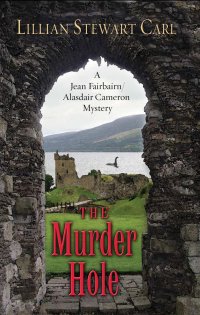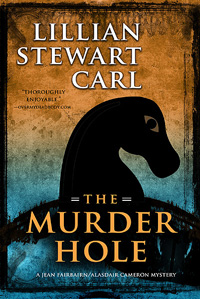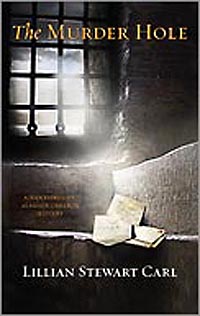


The Murder Hole
The Jean Fairbairn/Alasdair Cameron Series, Book
Two
Five Star Publishing, August 2006
Trade Paperback
ISBN 1-59414-480-X
Wildside Press, November 2009
Trade Paperback
ISBN 1-4344-0656-3
WorldWide Mystery Book Club, November 2011
ISBN-13: 978-0-373-26775-0
Find the Book| Reviews | Excerpt |
The Jean Fairbairn/Alasdair Cameron series, a cross-genre (mystery, romance, paranormal) series featuring Michael and Rebecca Campbell-Reid from Ashes to Ashes and Dust to Dust in cameo roles.
Deep water . . .
Jean Fairbairn is off to write a story about the haunted waters of Loch Ness.
She has an appointment with American scientist Roger Dempsey, who is using his
latest gadgets to try and prove that the legend of the monster, Nessie, is true.
Jeans business is checking out legends. Some hold water, some don't, and some
are about much more than H2O.
But the troubled water she finds at Loch Ness is colder than its snow-melt and
darker than its peat-stained depths. Sonar and other remote-sensing tools might
find Nessie, but what scientific instrument can plumb the mysteries of death?
Troubled, too, are the waters that run between Jean and Detective Inspector Alasdair
Cameron. Will another encounter bridge the depths that lie between them? Or will
their story end at the hands of a murderer, in the icy water of a loch that never
gives up its dead?

The ruins of Urquhart Castle on Loch Ness, from The Murder Hole:
The fortress had been built, and had fallen, and more structures had been built on top, only to be themselves modified over the centuries by the exigencies of war and clan raids and the weather, a formidable foe itself. Now even the "new" tower perched above the loch had partly collapsed, exposing the floor levels inside like an architectural model.
[The place was] teeming with humankind--Scandinavians, Africans, Moslem women in their head scarves. While Jean wasn't going to suggest joining hands and singing "Kumbaya," she had to smile at how the myth mongers had succeeded in giving the ruined building universal appeal . . . At least they hadn't Disneyed the place up with audio-animatronic clansmen and a Nessie running back and forth on an underwater track.
Reviews
"Carl creates vivid images of
the Scottish scenery and her characters ring true... This
is a thoroughly enjoyable addition to the series..." --
Shirley H. Wetzel, MyDeadBody.com
"The sequel to the delightful The Secret Portrait is
a fun contemporary police procedural investigative tale with the emphasis on
the reporter's inquiries. The story line cleverly combines
Nessie, an ancient historical stone with a twentieth
century history, a bit of romance, and murderous mayhem
into a fine tale starring a likable heroine." --
Harriet Klausner
The Murder
Hole is...not a frothy mystery to gulp down
in one sitting, it's a book to save for a lazy weekend or
relaxing vacation when there's time to savor the complexities
of the story and take in the scent and sense of Scotland. I
don't mean to imply that The
Murder Hole is a story readers will have
to slog through. Not at all. The author has a
wonderful sense of humor and gives us a story that moves
right along and a heroine who doesn't take herself too seriously." --
Diana Vickery, The Cozy Library
Top of Page
Excerpt
Chapter One
When Jean Fairbairn picked up the newspaper from her desk and turned to the friends melting into her couch, she felt as though she were picking up a gauntlet and choosing her seconds. "Did you see today's Scotsman?" she asked, and read aloud:
Inverness -- American scientist Roger Dempsey arrives at Loch Ness today to launch his Water Horse Expedition. He intends to prove once and for all whether Nessie is an actual animal or merely the sort of beastie one sees on the way home from the pub. "The carvings on the Pitclachie Stone," he says, "are incontrovertible evidence that the ancient Picts were familiar with the race of creatures we now call Loch Ness monsters. They clearly show the creature's head emerging from the water."
Experts at the Museum of Scotland who've studied the Pitclachie Stone say that it's an incomplete class I Pictish carved stone, dating from almost 2000 years ago, and that the symbols are typical of its time period.
The Stone is situated on Pitclachie Farm above Loch Ness, the home of environmental activist Iris Mackintosh. Miss Mackintosh declined an interview, saying only that Dr. Dempsey is not the first amateur scientist to see what he wants to see.
Dempsey dismisses the anonymous letter warning him off the expedition as the work of a crackpot, and will open the Midsummer Monster Madness Festival as scheduled. The Northern Constabulary is making inquiries.
Jean shoved her glasses up the damp bridge of her nose and sent a significant look toward her guests. While she theorized that most married couples grew to resemble each other, this thirty-something couple had probably looked alike from the beginning, their faces sculpted by intelligence, humor, and the refusal to suffer fools gladly. Although who was the fool now--Dempsey, Mackintosh, or Jean herself--remained to be seen.
"And you're away to interview the pair of them?" Michael Campbell-Reid asked. "Nothing like a bit of controversy and a threat or two for increasing the circulation. Yours and the magazine's as well, I reckon."
"Yes, Iris agreed to an interview with no problem, but then, she's never met me. Roger has, and he won't be so eager to please. Neither might the person who sent the anonymous letter to him."
Michael's wife, Rebecca, said, "Good luck," but either her tone added a silent you're going to need it or Jean's strolling paranoia added it in.
That Jean was taking the high road to Loch Ness tomorrow was one reason she was sweating. Not with heat-sweat, with flop-sweat. Luck? Never underestimate the power of luck, for good and for bad. Or was it luck alone that had turned her last trip out of town for an interview into a case of murder, which in turn had introduced her to a certain Northern Constabulary detective? Maybe it had been the variety of luck called fate.
Through the nearby window the Princes Street gardens and the rooftops of Edinburgh shimmered in a haze of heat, light, and water vapor. Jean felt as though she were looking into deep water through a glass-bottomed boat. But water in this part of the world more often hid than revealed. Especially the haunted waters of Loch Ness, its abyssal depths dark with peat and cold with snow-melt. Loch Ness never gave up its dead--or so the story went.
Her business was checking out stories. Some held water, some didn't, and some were about much more than H2O.
She set the newspaper on the desk, next to the Kelly-green stuffed Nessie toy that had arrived with Dempsey's press kit, and opened the window to its miserly limit. A warm breath of diesel, damp, and the sea filtered into the room. Ladies might glow, not sweat, but right now a runnel of glow trickled down her back beneath her T-shirt like the ectoplasmic tingle of a ghost along her senses. Stifling the sensation, she sat down next to her guests. "This is the first time since I moved here I've been hot. Of course, back in Texas we'd be wearing sweaters because of the air-conditioning."
"Hot? Speak for yourself. I'm toting around a little furnace, a.k.a baby Linda." Rebecca patted the globe of her abdomen, which strained against her Scottish: The Next Generation hatching T-shirt.
With a glance at his wife's stomach like that of a farmer inspecting his crops, Michael uttered a string of diphthongs and glottal stops that Jean interpreted as, "That's as may be, hen. Just now it's time to be off. Some of us are working for a living."
"No need to be stroppy just because I'm on leave." Rebecca might be the American part of the Campbell-Reid equation, but her accent was catching up fast with her husband's. She heaved herself toward the edge of the couch. Michael took her hands and hauled her to her feet, where she swayed a moment, orienting her center of gravity.
Jean stood up with considerably less physical effort--it was her psychic center of gravity that had been wobbling lately--and picked up the brown envelope lying on the coffee table. "May I take this with me?"
"Oh aye," said Michael. "The Museum has copies aplenty."
Jean pulled the large black and white photograph from the envelope. She'd already inspected it over tea and fortune cookies, but it was worth several more looks.
Judging by the meter stick propped against the fine-grained rock, the Pitclachie Stone stood about four feet tall and tapered smoothly upward to a jagged rim. The photographer's raking light, light that would have made a human face resemble a bleached skull, here cast the carved symbols into razor-sharp relief. A decorated crescent crossed by a right-angled line was paired with a horse's head that looked like the knight from a chess seat. A line beneath the horse's head could represent anything from the sculptor trying out his stroke to, as Dempsey claimed, the surface of Loch Ness.
Just above the crescent, a small hole pierced the rock. A figure eight-shaped symbol called a double disc barely fit between that and the broken edge, implying that a fourth symbol, the other half of a second pair, had been carved on the lost piece.
The stone conjured times past. It evoked human hands long gone to dust and thoughts lost beyond memory. If it had a voice, it would be calling Jean to its side. Even if none of her interviews produced anything to write about in her history-and-travel magazine, her journey would be worthwhile just to see this stone. "What a shame it's broken. I guess some old farmer thought a symbol stone was no more than pagan rubbish. At least he re-used part of it as a doorstep--face downward, thankfully."
"Oh aye," said Michael. "Save the Stone was broken a bit too recently for comfort. That edge isna weathered at all, not like the hole, so smooth it's dished out. Neither's the surface of the stone itself."
"Oh. I see." Jean turned the photo this way and that, and had to agree that the serrations along the broken rim were sharp as teeth, so long as the teeth were molars, not incisors. That was an even bigger shame, that someone would use a steel chisel on the stone . . . A chisel? Wouldn't ordinary vandals use a sledgehammer? "Do you think Ambrose Mackintosh did it?"
"He said he found the Stone there at Pitclachie Farm when he renovated an old cottage," Rebecca said. "But he didn't write about it in his Pictish Antiquities. He barely wrote about his amateur excavating at all, more shame to him. Or where he found that hoard of bronze and silver artifacts. To his generation archaeology meant collecting antiquities, not mapping out postholes."
"Maybe he thought he could get twice the money if he sold two stones instead of one," said Jean.
"Even in the nineteen-twenties, he'd know a Class I Pictish stone was more valuable in one piece. Besides, he didn't try to sell it. He didn't even tell anyone he had it. It was Iris who reported it to the Museum, just last year."
"We were hoping you'd be asking her for the details," added Michael, "considering the Museum's not got the resources for a proper excavation at Pitclachie. And the site's on private land, not endangered by construction or the like. Whatever's beneath the sod is better off there, considering an archaeologist murders his witnesses."
While Jean appreciated that excavating a site destroyed it, and agreed that not publishing your results was the equivalent of burning and pillaging, she would have shied away from that particular metaphor. More sweat trickled down her back. She should consider trying out for an anti-perspirant commercial.
Rebecca's roll of her eyes toward Michael--no, diplomacy was not his forte--footnoted her cheery, "Good luck."
Well, Jean told herself in as chipper an internal voice she could muster, since the Campbell-Reids had not one but two murder cases in their past, the fact that Michael didn't shy away might mean that the raw scabs of memory could eventually turn into scars. She slipped the photo back into its envelope and said, "Yeah, right, that's a great way to start the interview. Hey, Iris, did your dad indulge in a bit of archaeological vandalism along with Nessie-spotting and wizard-watching?"
"Wizard-watching, eh?" Michael repeated, undaunted by Rebecca's wifely disapproval. "You're covering--or uncovering, rather--Ambrose's old scandal, are you?"
"I'm afraid so. That's Miranda's idea. She runs Great Scot, you know, I'm just the silent partner. I can't blame her for trying to get more bang for the bucks--the pounds--she's spending to set me up in Iris's B&B." Jean put the photo on her desk, picked up a plastic Waterstone's bag, and pulled a paperback book from inside. Its cover was decorated with black and white drawings of symbols as enigmatic as those on any Pictish stone. In lurid red letters across the top was written, Loch Ness: the Realm of the Beast. By Ambrose Mackintosh. "No, this isn't about Nessie. It's a reprint of Ambrose's biography of his guru, Aleister Crowley."
"That nut case back in the early twentieth century who claimed to be a magician?" Rebecca took the book and flipped through it.
"He was an egotistical maniac," said Michael. "So mad for attention he named himself the Beast from Revelations, created his own religion, and made a meal of the scandals. Went through women like loo paper, drove more than one to suicide."
Rebecca considered a chapter heading. "He had a house at Loch Ness, didn't he?"
"Oh aye," Michael said. "I was raised in Inverness, mind. Folk thereabouts are right affectionate toward Nessie, with her turning a few bob for the community and all. Never saw so much as an air bubble myself, but there are those who swear something's there. Crowley, now, they're squeamish about Crowley. His estate at Boleskine has an eerie air even today."
"Any ghosts?" asked Rebecca with refreshing matter-of-factness.
"Never hung about long enough to notice. And I canna speak for Pitclachie, either. Still, my granny was dead certain Ambrose murdered his wife in some sort of occult ceremony."
"The verdict at his trial was Not Proven. The prosecutors had no body and no real evidence, police procedure being a lot more casual in nineteen-thirty-three than it is now." As I know only too well, Jean added to herself, anything but chipper. She took the book from Rebecca's hand and fanned its pages, casting a wisp of cool breeze on her face. "Not that evidence is Ambrose's strong point--he says here that Crowley was really able to work magic. Exhibit A being Nessie, which he called from another reality."
Rebecca grinned. "That theory is as good as the one that says Nessie is the escaped pet of aliens who dropped by the loch in their UFO for a picnic."
"And just as likely," said Michael. "Strange how no one said a verifiable word about Nessie until Ambrose Mackintosh reported that first spate of sightings in nineteen-thirty-three. Not even Crowley, who'd have taken credit if there'd been credit to take."
"It's the strange that's going to make this story--these stories--ones that will sell magazines. That's the idea, at least." Jean set the book down on the desk beside the photo and the Nessie toy. "Speaking of pets. Not to mention aliens . . ."
Her cat, Dougie, lay along the windowsill, his paws extended like a miniature gray sphinx, his ears rotated toward her. When she walked over and picked him up, he lay as limp in her arms as a fur stole, his half-open amber eyes saying: The shrine isn't open just now, formal services are at mealtime.
"You're going to visit Riccio for a few days," Jean informed him. She carried Dougie into the bedroom and thrust him into the pet carrier hidden behind the bed so swiftly he didn't have time to transform into a feline caltrop and jam himself in the opening. Only when the gate clicked behind him did he realize what was up, and Jean felt his baleful gaze through the air holes.
She dumped his creature comforts into the empty Waterstone's bag, added Dempsey's toy Nessie, and handed the bag to Michael. "Thanks for taking the little guy in. Usually Hugh next door looks after him, but he and his band are finishing their tour at the Festival this weekend. It's actually been quiet around here--I love folk-rock, but not through the wall at two a.m."
Michael, himself a piper, grinned. "Eh, what's that you say?"
Rebecca laughed. "If you don't mind carrying Dougie, Jean, we'll walk up to the High Street and hail a taxi there. I need to keep moving."
"Sure." Hoisting the cat carrier, Jean followed the others outside and shut the door.
"Mind your step, hen." Michael's hand hovered solicitously at Rebecca's elbow as she started picking her way across the cobblestone courtyard of Ramsay Garden.
From here, the tall brightly painted buildings with their whimsical cupolas and balconies seemed merely an idiosyncratic collection of apartments. It was only from Princes Street that you could see the full picture, the fanciful structures wedged in between the medieval threat of the Castle and the Victorian sanctimony of the University School of Divinity. But then, the street plan of Edinburgh was only one exercise in perspective.
Rebecca's rosy complexion ripened to crimson and her steps faltered. Michael put his arm around her, propelling her up the steep slope of Ramsay Lane. Jean dragged along behind. Dougie was gaining weight at every step--on purpose, she was sure.
They emerged onto the High Street and stood panting next to the door of the Camera Obscura. The shadow cast by the tall medieval buildings only partly relieved the hot, acrid air trapped in the tunnel of the street. To the right the Castle loomed beyond thickets of pipes and braces. Already the bleachers for the yearly Festival were under construction. Statues of various historical worthies looked as though they were playing hide and seek in the scaffolding.
Scaffolds of death and dismemberment had once stood on the castle esplanade. If Aleister Crowley or Ambrose Mackintosh had lived several hundred years ago, they'd have met those scaffolds up close and personally. But now sudden death was shocking, not just one more encounter on your way to dinner. Thank goodness, Jean thought, for changing human perspective.
Michael gestured. A taxi that had just dropped off a couple at the posh Witchery Restaurant made a U-turn and pulled up to the curb. Jean opened the rear door and stowed the pet carrier inside. "Dougie, remember you're Riccio's guest and behave accordingly." Behind the grating, Dougie's bright eyes closed, resigned to his fate.
"Thanks for dinner." Rebecca managed a sideways hug. "Have a good trip, okay? Don't worry, nothing's going to sneak up on you."
"Nope, I'll be glancing over my shoulder so often I'll see it coming." Jean returned the hug. "You know me. I'm evidence that worry works--ninety-five per cent of what I worry about never happens."
With an encouraging wink at Jean, Michael piloted Rebecca into the interior of the taxi and clambered in after her, leaving Jean to admire not only his denim-clad posterior, but also how he could protect his wife without patronizing her. "Give us a shout if you find the rest of the Pitclachie Stone or anything else Ambrose left lying about in his shrubbery. Or if Dempsey turns up Nessie, though I'm not holding my breath for that."
"Oh he'll turn up something. He always does." Jean stood waving as the taxi moved off.
In the distance a siren wailed. A tourist bus lumbered off down the High Street, known more evocatively as the Royal Mile, strewing myth like pixie dust among the shops, pubs, and offices of real life. But then, myth--personal, national, and everywhere in between--was real life.
And right now real life demanded that Jean go home and pack. She might not be entirely resigned to her fate, but at least she could meet it wearing clean underwear. She made a firm about-face and found herself confronting the window of the Tartan Weaving Mill.
On it was taped a poster: Midsummer Monster Madness, sponsored by Starr Beverages PLC and the NEW! Cameron Arms Hotel. Drumnadrochit, Loch Ness, June 21-23. Beneath the words a green cartoon dragon wearing a Glengarry bonnet held a pint of beer in one hand--not flipper, hand--and a set of bagpipes in the other. The conceit was innocuous to the point of banality, the cold depths of the loch notwithstanding.
With a wry shrug, Jean headed back to Ramsay Garden. She was just skirting a shiny red sports car that was now parked next to and repeating the color of her potted geraniums when she realized her front door was standing open. What with Dougie, she hadn't locked it. But she could have sworn she'd shut it.
Oh boy. And then there was the myth that your own doorstep was free of danger. Clenching her fists at her sides, she climbed the steps and paused on the threshold. "Hello?"





